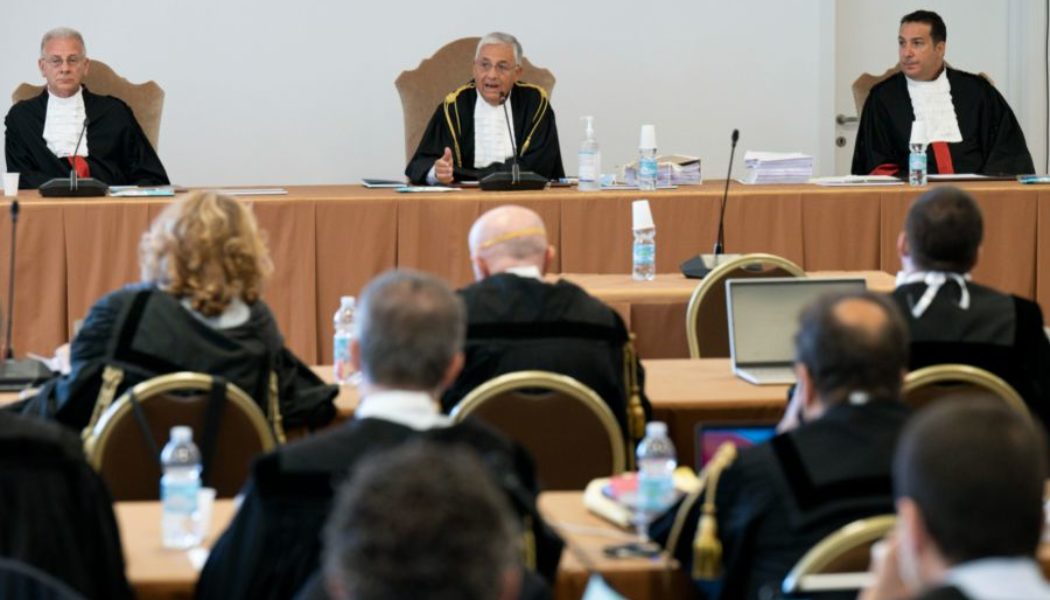Discover
Beautiful video: Watch as a young woman bids farewell to her family and enters a cloistered convent…
This is so beautiful! 😭 Catholic journalist and Shalom World correspondent Sachin Jose posted a tearjerking video on the Oct. 5 feast of St. Faustina. The video depicts “a young woman entering cloistered life as a Carmelite nun.” Family and friends surround the young woman as she “leaves the world” for a life in the cloister. Cloistered, or enclosed convents, often limit or cut off all outside communication with the outside world, including all family and friends. The post does not specify the location of the Carmelite order the woman enters. However, the habit resembles that of St. Therese of Lisieux. Here’s the video below: A young woman entering cloistered life as a Carmelite nun. Heart touching moments 😢🙏🙏 pic.twitter.com/XEfgzdlUQj — Sachin Jose (@Sachi...
Vatican finance trial: Judges to rule whether to keep or scrap case in face of procedural missteps…
The investigation, due to four decrees from Pope Francis, was carried out with huge leeway for actions usually not permitted by Vatican law, including the use of wiretaps. If the court orders the investigation to begin again, these allowances would no longer be available to investigators. The case is in jeopardy because of missing materials prosecutors have not made available to the defense attorneys. Most contested are the video files of interviews with Msgr. Alberto Perlasca, a suspect of the investigations who was not charged and is now a significant witness for the prosecution. Defense lawyers say they need to review the recordings because a summary they were provided with is missing information. They are also still waiting to receive copies of forensic evidence gathered from defendant...
100 years ago, bureaucratic structures did not dominate Church life as they do today. What happened?
In the 1970s, during the heyday of the chaos that followed Vatican II, a French bishop, when asked why he did not more firmly address the crisis, replied, “What can I say? I wasn’t chosen because they thought they might find a prophet in me, but just an administrator.” The Church has always struggled to find good leaders (especially bishops). However, as recently as a hundred years ago, bureaucratic structures did not dominate its life as they do today. What happened? In 1941, James Burnham published The Managerial Revolution, which might help shed some light on the situation. Burnham was a former Marxist who claimed that Western nations were transitioning from a capitalist society to a “managerial” one in which power would pass from owners of capital to managers who controlled the i...
Elephant in the sanctuary: Spot the news hooks in the shocking changes facing Cincinnati Catholics…
Let’s do the math. When discussing the future of the American Catholic Church, Joe Biden isn’t the biggest issue on the table. Biden’s liberal Catholicism may be a symptom of larger issues — and since it’s political, it’s easier to cover — but it isn’t the issue that’s going to lock the doors of many parishes from coast to coast, but especially in blue culture zones. The big issue? Actually, it’s several connected issues — and the elephant in the living room (or sanctuary) is that links them. Hold that thought. The obvious issues? The priest shortage. Declining enrollment rates in Catholic schools. Closed parishes. You can also add declining Mass attendance numbers in many, but clearly not all, parishes. I would add the collapse in the number of Catholics going to Confession. This brings u...
Biden administration allows funding of abortion referrals, providers under new rule…
However, in April the Department of Health and Human Services (HHS) announced a proposed reversal of the 2019 Title X program requirements. According to the final rule, which will be officially published in the Federal Register on Oct. 7, Title X recipients can provide “nondirective” counseling to patients, including on abortion. The political action arm of Planned Parenthood applauded the announcement on Monday. “Great Monday news: there will no longer be a gag rule on #TitleX funding!” the Twitter account for Planned Parenthood Action stated. In 2019, Planned Parenthood withdrew from the Title X program rather than comply with the Trump administration’s prohibitions on abortion referrals and requirement of physical separation of Title X clinics from abortion facilities. Planned Parenthoo...
What conscience dreads and prayer dares not ask…
The Collect (Opening Prayer) for this week’s Masses (27th Week of the Year), though directed to God, teaches us that our prayer is not always about things with which we are comfortable. It sometimes leads us to examine areas of our life in which we struggle with sin or we struggle to desire to be free of sin. Here is the prayer: Almighty ever-living God,who in the abundance of your kindnesssurpass the merits and the desires of those who entreat you,pour out your mercy upon usto pardon what conscience dreadsand to give what prayer does not dare to ask.Through our Lord Jesus Christ, your Son,who lives and reigns with you in the unity of the Holy Spirit,one God, forever and ever. After asking for God’s mercy and acknowledging that He offers us more than our minds can grasp, we make the follow...
Who was St. Francis of Assisi? 12 things to know and share…
St. Francis is one of the most famous saints in Church history. He’s so significant that the current pope — Pope Francis — chose to take his name. Oct. 4 is his memorial day. But who was he, and what did he do? Here are 12 things to know and share… 1) When did St. Francis live? He was born in 1181 or 1182 (we’re not sure), and he died in 1226. He thus lived to be only 44 or 45 years old. He was born — and he died — in Assisi, Italy, which is somewhat near Rome. You can read about Assisi here. 2) How did he get the name “Francis?” Although many people take new names upon entering religious life, this is not how St. Francis originally got his name. He was born Giovanni (John) di Bernardone, but in his infancy, his father, Pietro (Peter), began calling him Francesco (“the Frenchman”). W...
Sex abuse probe: French churches have had 3,000 child abusers, two-thirds of them priests, in past 70 years…
PARIS — An independent commission examining church sex abuse in France believes that 3,000 child abusers — two-thirds of them priests — have worked in the church over the past 70 years. The estimate was given by the commission president, Jean-Marc Sauvé, in an interview published Sunday in the Journal du Dimanche newspaper. The commission has been investigating for 2 1/2 years. Its full findings are scheduled to be released on Tuesday. In the interview, Sauvé did not give a figure on the number of sex abuse victims but said the report does include a new estimate. Asked about the commission’s work investigating child abusers, he said: “We evaluated their number at 3,000, out of 115,000 priests and church people since the 1950s. Two-thirds are diocesan priests.” He said 22 cases have been fo...
The USCCB has 35 standing committees and subcommittees. My battle cry for Church renewal? Debureaucratization!…
By Dr. Jeff Mirus ( bio – articles – email ) | Oct 01, 2021 OK, I guess “debureaucratization” will never become an effective slogan; it hurts the eyes just to look at the word. But, to put the matter in a largish nutshell, the abandonment of the bureaucratic model of Church governance is probably the single most important path in our time to Catholic institutional renewal, and what we might also call genuine synodality. Another way to say this is that we need to put the emphasis back on personal episcopal authority and personal Christian responsibility. And to do this, one of the first tasks is to dismantle the massive national episcopal conferences, which tend to turn the Church into a bureaucracy. To a far more limited extent, this may also be true within some dioceses, and e...
The Chinese takeout box is as American as baseball and apple pie…
It may be hard to believe, but for a brief moment in history, oysters were one of the most popular foods along the Eastern US coast, especially in New York City. Cheaper than poultry, the bivalve saltwater mollusk was affordable for the working class, thanks to advances in dredge harvesting. As plentiful and inexpensive as oysters were, getting to the fleshy bits requires a bit of skill. What’s more, once shucked, they don’t stay fresh for very long, a more pressing concern before widespread refrigeration. The need for an inexpensive, watertight package that can safely carry oysters home inspired the eventual invention of the “oyster pail,” an early version of which was patented in 1890, then significantly improved upon in 1894 by Frederick Weeks Wilcox. The new version could be form...
The best way to keep your bread fresh for longer is not what you think…
Even with the vast number of delicious meals you can make with bread—fluffy French toast, avocado toast, paninis—chances are that you aren’t going through a whole loaf in the span of a couple of days unless you’re cooking for a whole household of people. And if you’ve ever tried making a sandwich with stale bread, you know it just won’t cut it. (Literally…it’s super hard to cut.) Or even worse, the nightmare of biting into moldy bread—bleh! Bread has a relatively short shelf life. Homemade bread lasts only three to four days and store-bought bread lasts about a week. But according to expert bread maker and the author of Artisan Sourdough Made Simple ($17) Emilie Raffa, how you’re storing your bread makes a huge difference in terms of how long it ma...
Marriage is a miracle!…
Both today’s first reading and the Gospel speak to us of the miracle of marriage. If your marriage is working even reasonably well, it is a miracle! We live in an age that is poisonous to marriage. Many people look for marriage to be ideal, and if there is any ordeal, they want a new deal. Our culture says, if it doesn’t work out, bail out. Marriages are also a miracle because they are, ultimately, a work of God. Today’s readings bring before us some fundamental teachings on marriage. Let’s look at today’s Gospel in five stages. I. Rejection – The Gospel opens with the Pharisees approaching Jesus and asking, somewhat rhetorically, “Is it lawful for a husband to divorce his wife?” Jesus, aware of their hypocrisy (they do not really want an answer from Him on which to base their lives), asks...





















